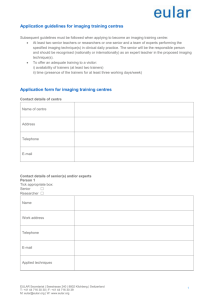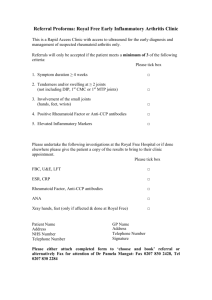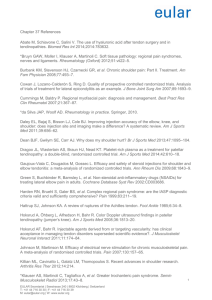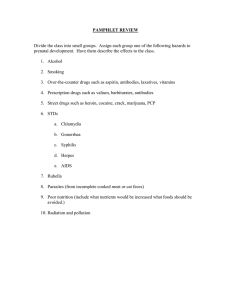blood test may help predict rheumatoid arthritis treatment
advertisement
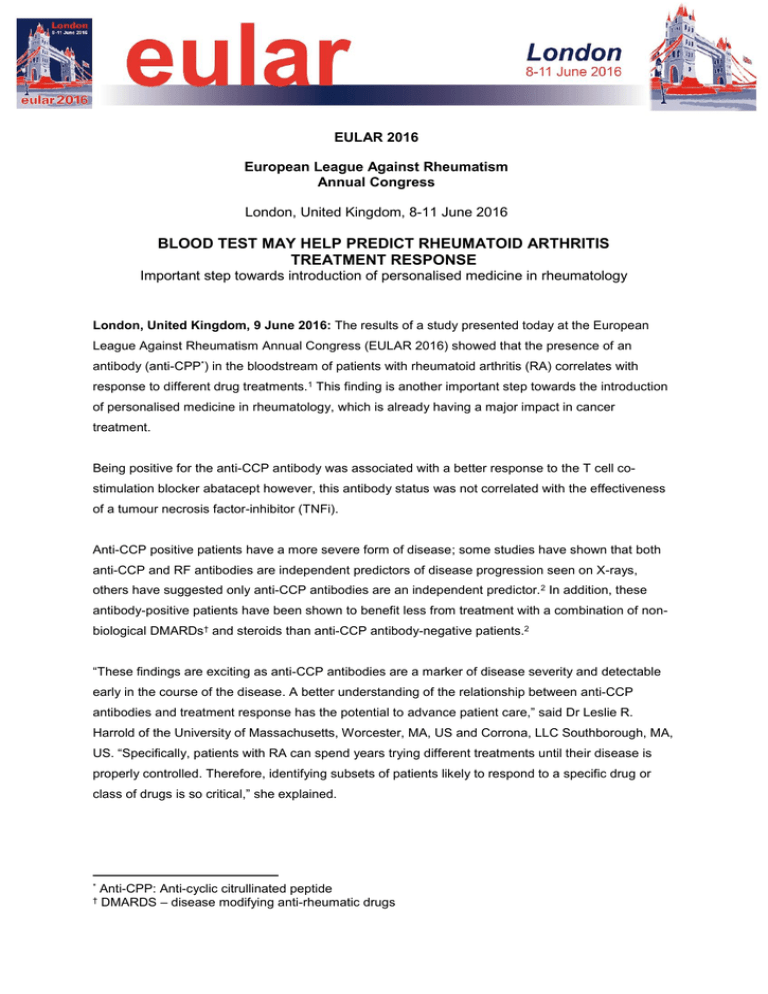
``` EULAR 2016 European League Against Rheumatism Annual Congress London, United Kingdom, 8-11 June 2016 BLOOD TEST MAY HELP PREDICT RHEUMATOID ARTHRITIS TREATMENT RESPONSE Important step towards introduction of personalised medicine in rheumatology London, United Kingdom, 9 June 2016: The results of a study presented today at the European League Against Rheumatism Annual Congress (EULAR 2016) showed that the presence of an antibody (anti-CPP*) in the bloodstream of patients with rheumatoid arthritis (RA) correlates with response to different drug treatments.1 This finding is another important step towards the introduction of personalised medicine in rheumatology, which is already having a major impact in cancer treatment. Being positive for the anti-CCP antibody was associated with a better response to the T cell costimulation blocker abatacept however, this antibody status was not correlated with the effectiveness of a tumour necrosis factor-inhibitor (TNFi). Anti-CCP positive patients have a more severe form of disease; some studies have shown that both anti-CCP and RF antibodies are independent predictors of disease progression seen on X-rays, others have suggested only anti-CCP antibodies are an independent predictor. 2 In addition, these antibody-positive patients have been shown to benefit less from treatment with a combination of nonbiological DMARDs† and steroids than anti-CCP antibody-negative patients.2 “These findings are exciting as anti-CCP antibodies are a marker of disease severity and detectable early in the course of the disease. A better understanding of the relationship between anti-CCP antibodies and treatment response has the potential to advance patient care,” said Dr Leslie R. Harrold of the University of Massachusetts, Worcester, MA, US and Corrona, LLC Southborough, MA, US. “Specifically, patients with RA can spend years trying different treatments until their disease is properly controlled. Therefore, identifying subsets of patients likely to respond to a specific drug or class of drugs is so critical,” she explained. * † Anti-CPP: Anti-cyclic citrullinated peptide DMARDS – disease modifying anti-rheumatic drugs ``` “Our findings have shown that the effects of TNF inhibitors are not dependent on the ACPA antibody status. However, the outcomes of patients receiving the T cell co-stimulation modulator abatacept were dependent on ACPA status with better responses observed in those who were positive for antiCCP antibodies, compared to those who didn’t have these antibodies,” Dr Harrold concluded. This study evaluated the impact of anti-CCP and RF antibodies on treatment response separately in patients initiating abatacept or TNFi. For the 566 patients who initiated abatacept, double positive status was associated with a significantly greater response compared with double negative status on all outcomes (disease activity measures and achievement of remission). Additionally, single positive status was associated with a greater likelihood of remission as compared with double negative status for abatacept users. Conversely, there were no significant differences in responses between antiCCP/RF groups in the 1,715 TNFi users. When the study team investigated the relationship with antiCCP and RF separately, the responses shown were driven by seropositivity to anti-CCP antibodies alone and that RF was not an independent factor influencing response. The investigators concluded that the differential effect of anti-CCP antibody status on treatment response may be due to differences in the mechanism of action between the treatment agents. Abstract Number: OP0178 -ENDSNOTES TO EDITORS: For further information on this study, or to request an interview with the study lead, please do not hesitate to contact the EULAR congress Press Office in the London Suite at ExCel London during EULAR 2016 or on: Email: eularpressoffice@cohnwolfe.com Onsite tel: +44 (0) 7725 915 492 / +44 (0) 7786 171 476 Twitter: @EULAR_Press Youtube: Eular Pressoffice About EULAR The European League Against Rheumatism (EULAR) is an umbrella organisation which represents scientific societies, health professional associations and organisations for people with Rheumatic Musculoskeletal Diseases (RMD) throughout Europe. EULAR aims to promote, stimulate and support the research, prevention, and treatment of RMD and the rehabilitation of those it affects. ``` EULAR underlines the importance of combating rheumatic diseases not only by medical means, but also through a wider context of care for rheumatic patients and a thorough understanding of their social and other needs. EULAR is supported in this mission by its 45 scientific member societies, 36 PARE (People with Arthritis/Rheumatism in Europe) organisations, 22 HPR (Health Professionals in Rheumatology) associations and 23 corporate members. The EULAR Annual European Congress of Rheumatology is the foremost international medical meeting announcing the latest research on rheumatic and musculoskeletal diseases. EULAR 2016 is expected to attract over 14,000 delegates from around 120 countries. Most if not all professions working in the vast field of RMD will be represented. To find out more about the activities of EULAR, visit: www.eular.org References 1 EULAR 2016; London: Abstract OP0178 Farragher TM, Lunt M, Plant D, et al. Benefit of early treatment in inflammatory polyarthritis patients with anti–cyclic citrullinated peptide antibodies versus those without antibodies. Arthritis Care & Research. 2010; 62(5): 664-675. doi:10.1002/acr.20207 2
